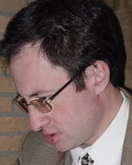09.09.2005
Boris Gelfand gives his view

What do you think about the cooperation between the ACP and FIDE? What is the prospective of such cooperation?
This cooperation is a positive fact. Neither side can afford confrontation, bearing in mind today's situation in the chess world. However, it is disturbing that FIDE had undertaken a positive step prior to the previous elections – the Prague Agreement, but after the elections the FIDE leadership started an aggressive war against the chess world: the Prague Agreement was forgotten, all Kasparov's matches ruined, they conducted a so-called championship in Libya, and so on. I am worried that such a situation can be repeated.
Should the ACP Tour be included into the world championship cycle in some way? What pro and contra arguments should be considered to make a decision?
In my opinion, the ACP Tour is currently at the initial stage of its development. So far it is just a scoring system. Neither own competitions nor a final tournament were organized. I think we should wait for this system to stabilize. For example, the ACP Board included some national championships into the Tour this season, which is without a doubt a correct decision. I also think that as rapid tournaments earn 50% of the Tour points given to classical tournaments of the same Level, then tournaments with FIDE control should receive, say, 70%, as it was suggested by Garry Kasparov for a unified rating system. One should find a way to include top team events into the system. For instance, the top board tournament in Russian and Spanish leagues is equivalent to the 18th category, the second board corresponds to the 16th-17th, but they are not counted at all!
Probably, in future the ACP Tour results could be incorporated into the world championship cycle. However, it would be nice if the championship cycle stabilized itself! I like the system that existed in 1948-1993 – candidates tournament or matches, and the championship match. The champion's privileges are almost certainly atavism, though.
Are you comfortable with the present situation with two official time controls? Which one do you prefer? But I would better ask whether your opinion has changed?
Indeed, one does not have to ask. An alternative suggested at the meeting just illustrated how absurd is FIDE's decision-making. FIDE acknowledges that its time control is unacceptable for a majority of players, and comes with a new variant, which has no advantages over the classical control, although it is a step forward compared to the previous one. This situation is like somebody steals a 100 roubles from you, and then says, ok, I'll return 80... There is only one explanation of this discussion still going on – FIDE leaders try to convince us that they have power and can do whatever they want.
I have arrived from Spain, where I played for a team. The opponents were very strong (18th category!), but there were almost no good games, because of the FIDE control. A quality of play was especially poor after the 40th move – one blunder after another!
What do you think about possible introduction of a new title that surpasses a GM title? Which criteria should be used to determine 'super-GMs'?
This is a good idea. One should approach a problem of grandmaster multiplication from two sides. First, the norms must be made stricter. Rating inflation in recent decades made them almost meaningless. Second, one should be tougher about "ghost tournaments" and cases of bought norms (or decisive games). And, of course, it is sensible to introduce a new SuperGM title. It is difficult to state the criteria, but, for instance, the title could be given to those who won in the 16th or higher category tournaments, strong opens (Aeroflot, European championship), or was a member of world's top 10-top 20. Obviously, the inflation must be taken into the account.
This article is published with permission of Association of Chess Professionals
